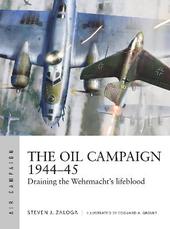
|
The Oil Campaign 1944-45: Draining the Wehrmacht's lifeblood
Paperback / softback
Main Details
| Title |
The Oil Campaign 1944-45: Draining the Wehrmacht's lifeblood
|
| Authors and Contributors |
By (author) Steven J. Zaloga
|
|
Illustrated by Edouard A. Groult
|
| Series | Air Campaign |
|---|
| Physical Properties |
| Format:Paperback / softback | | Pages:96 | | Dimensions(mm): Height 248,Width 184 |
|
| Category/Genre | Second world war |
|---|
| ISBN/Barcode |
9781472848543
|
| Classifications | Dewey:940.54213 |
|---|
| Audience | | General | | Professional & Vocational | |
|---|
| Illustrations |
Illustrated throughout with 64 photos and at least 14 pages of colour illustrations.
|
|
Publishing Details |
| Publisher |
Bloomsbury Publishing PLC
|
| Imprint |
Osprey Publishing
|
| Publication Date |
23 June 2022 |
| Publication Country |
United Kingdom
|
Description
A new illustrated history of one of the key air campaigns of late World War II - the American effort to cripple Germany's oil production, and grind its armed forces to a halt. With retreating German forces losing their oilfields on the Eastern Front, Germany was reliant on its own facilities, particularly for producing synthetic oil from coal. However, these were within range of the increasingly mighty Allied air forces. In 1944 the head of the US Strategic Air Forces, General Carl Spaatz was intent on a new campaign that aimed to cripple the German war machine by depriving it of fuel. The USAAF's Oil Campaign built up momentum during the summer of 1944 and targeted these refineries and plants with its daylight heavy bombers. Decrypted German communications made it clear that the Oil Campaign was having an effect against the Wehrmacht. Fuel shortages in the autumn of 1944 forced the Luftwaffe to ground most of its combat units except for fighters involved in the defense of the Reich. Fuel shortages also forced the Kriegsmarine to place most of its warships in harbor except for the U-boats and greatly hampered German army campaigns such as the Battle of the Bulge in December 1944-45. This fascinating book packed with key photos and illustrations examines the controversies and debates over the focus of the US bombing campaign in the final year of the war, and the impact it had on the war effort overall.
Author Biography
Steven J. Zaloga received his BA in History from Union College and his MA from Columbia University. He has worked as an analyst in the aerospace industry for over three decades, covering missile systems and the international arms trade, and has served with the Institute for Defense Analyses, a federal think tank. He is the author of numerous books on military technology and military history, with an accent on the US Army in World War II as well as Russia and the former Soviet Union. He currently lives in Maryland.
ReviewsThis author really needs no accolade from the likes of me. Once again, he provides an excellent description and analysis of WWII equipment, tactics, operational method, and strategic impact in a well-blended and thoroughly researched manner. Allied industrial/military intelligence identified the German oil industry as a critical point in their infrastructure, the crippling of which would lead not only to severe logistics issues (including the loss of associated key chemical by-products such as nitrogen for explosives) but also attrition of German fighter defences in aerial combat. The book focuses on the operational and strategic aspects of the campaign rather than detailed (but still adequate) descriptions of equipment - aircraft and anti-aircraft, radar and anti-radar - so is ideal for that level of wargaming. There are numerous tables of bomb tonnage, sorties, oil production, fighter strength, etc set against a background of mammoth air 'missions', with up to 2,000 Allied bombers and fighters at a time. German fighter losses in the later engagements were horrific - up to 50% of aircraft engaged. An excellent account, with a good bibliography too. -- Chris Jarvis * Miniature Wargames * This fascinating book packed with key photos and illustrations examines the controversies and debates over the focus of the US bombing campaign in the final year of the war, and the impact it had on the war effort overall. This campaign was so successful the Luftwaffe had to ground most of its aircraft due to the fuel shortage caused by the campaign. -- Jason Hubbard * Irregular Magazine *
|